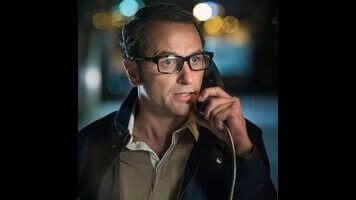The Americans: “Baggage”

I admire The Americans’ ability to make espionage look like a horrible job that’s also the sexiest career in the world. Glamorizing spycraft is no difficult task: Just listen to the James Bond scores of John Barry, which imply secret rendezvous, incredible gadgets, and clandestine hanky-panky even when they’re divorced from actual images of those scenarios. But Americans episodes like “Baggage” put the lie to the always exciting lives of 007, Emma Peel, and other fictional Cold War operatives. Elizabeth and Philip Jennings are trained killers with killer looks, but The Americans wants us to understand the people behind the spies. Sometimes that means showing Elizabeth—in practically the same hand-to-ear pose as last week, framed almost identically to the way she’s framed in “EST Men,” suggesting that she’s been doing this a lot—listening to a recording of her dying mother. Other times, it involves depictions of the Jennings acting as their own cleaning crew.
As a title, “Baggage” is as literal as The Americans gets. We’re talking about the psychological tonnage carried by our favorite married spies, but we’re also talking about the suitcase that Elizabeth apparently rescued from the American Tourister gorilla cage in order to transport Annelise’s corpse out of that hotel room. This is not the alluring excess that decades of martini-swilling, bed-hopping secret agents have promised us. This is ugly, evil, trail-covering necessity, treated with some of the most punishing sound design I’ve ever encountered on TV. “Baggage” makes us feel the pain that Annelise can no longer feel in every stomach-churning crunch. You want proof of the great performances that are being delivered on this show? Just remember that there probably weren’t any broken-bone sound effects on set.
Though it falls short of the heights reached by the season premiere, this week’s episode still offers plenty to chew on—especially with regard to The Americans’ anti-mythmaking. As Zinaida Preobrazhenskaya (Svetlana Efremova) is removed from a shipping crate and presented to the D.C. press, my thoughts turned to her counterparts in Soviet defection who came to North America to play professional hockey in 1989. Taking place during the dying days of the Soviet Union, under the glasnost policies of Mikhail Gorbachev’s government, these defections had lower stakes than Zinaida’s, but the pageantry was almost the same. (See also: The classic Sergei Federov “From Russia With Love” poster, the faux-Bond stylishness of which belies the fact that Federov defected by ditching Team Russia during the 1990 Goodwill Games in Seattle.) The de-personification of her arrival is line with players who were “sold” (via contract) from their teams in the motherland to National Hockey League organizations: Zinaida arrives in the States as cargo, and no one at the FBI can be bothered to pronounce her name until “Baggage” is practically finished. Driving that point home—a little too hard, perhaps, but that’s his way—Gaad at one point says to Stan, “Don’t let [Pause.] what’s-her-name get killed.”
But that’s just part of the job: Within the confines of what they do for a living, Stan, Elizabeth, Philip, and Oleg aren’t people—they’re assets. And as with that term’s financial connotation, those assets can be leveraged for personal, professional, or political gain, as Stan did to Nina at the end of season two. That gives Philip’s reluctance about Paige’s KGB future a mighty powerful impetus. As “Baggage” depicts Nina’s life in the labor camp and unfolds the sagas of Yousaf and Zinaida, it backgrounds the Paige storyline. But the notion remains in play: It’s the source of the Philip-Elizabeth fight that snakes its way through the episode, a wound to their marriage whose treatment they can’t agree upon. Symbolically, it’s that tooth that got busted during Elizabeth’s scuffle with the FBI. He wants it yanked out; she knows that’s unrealistic, because someone’s bound to notice if they do something that drastic.
 Keep scrolling for more great stories.
Keep scrolling for more great stories.
